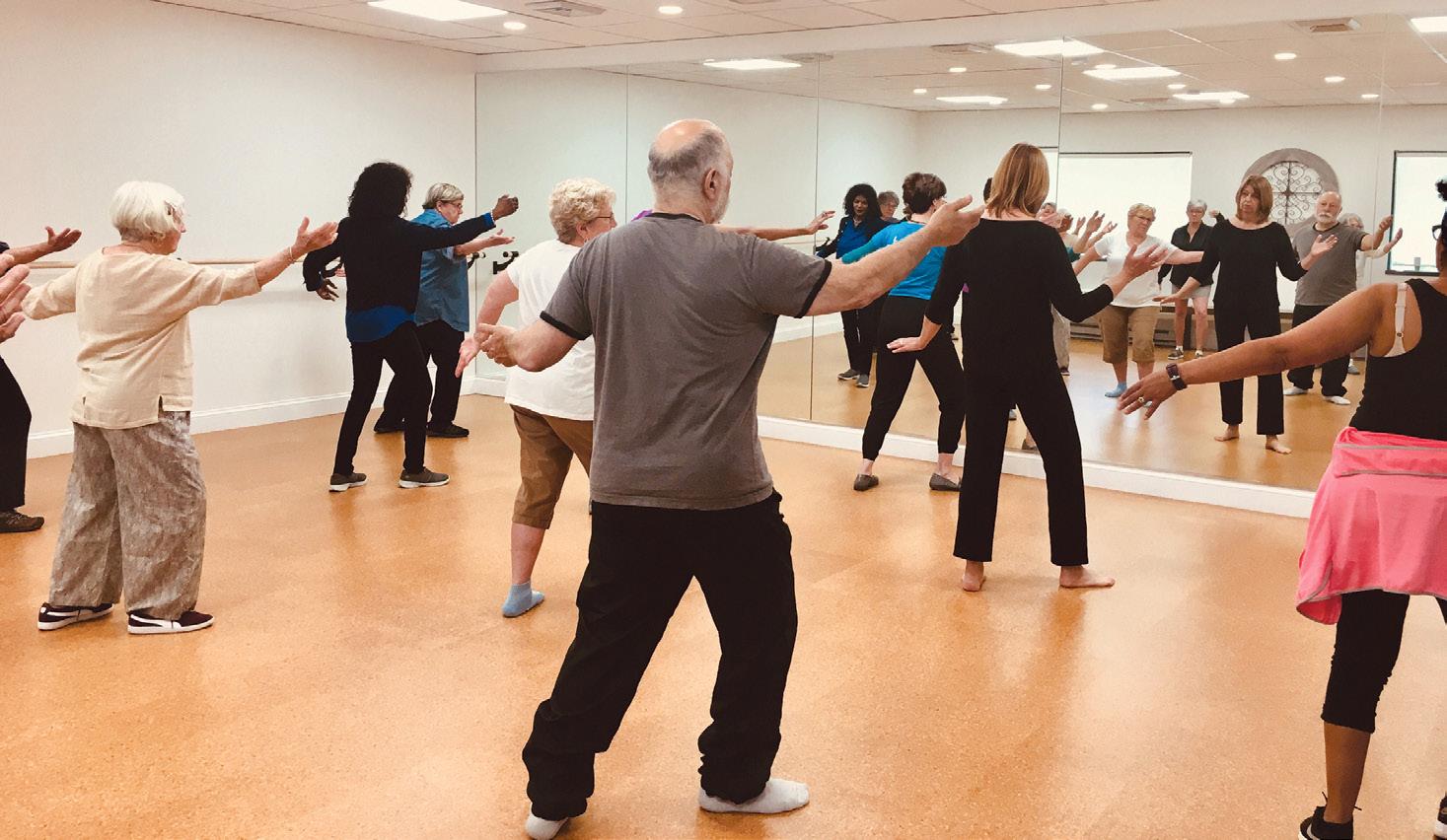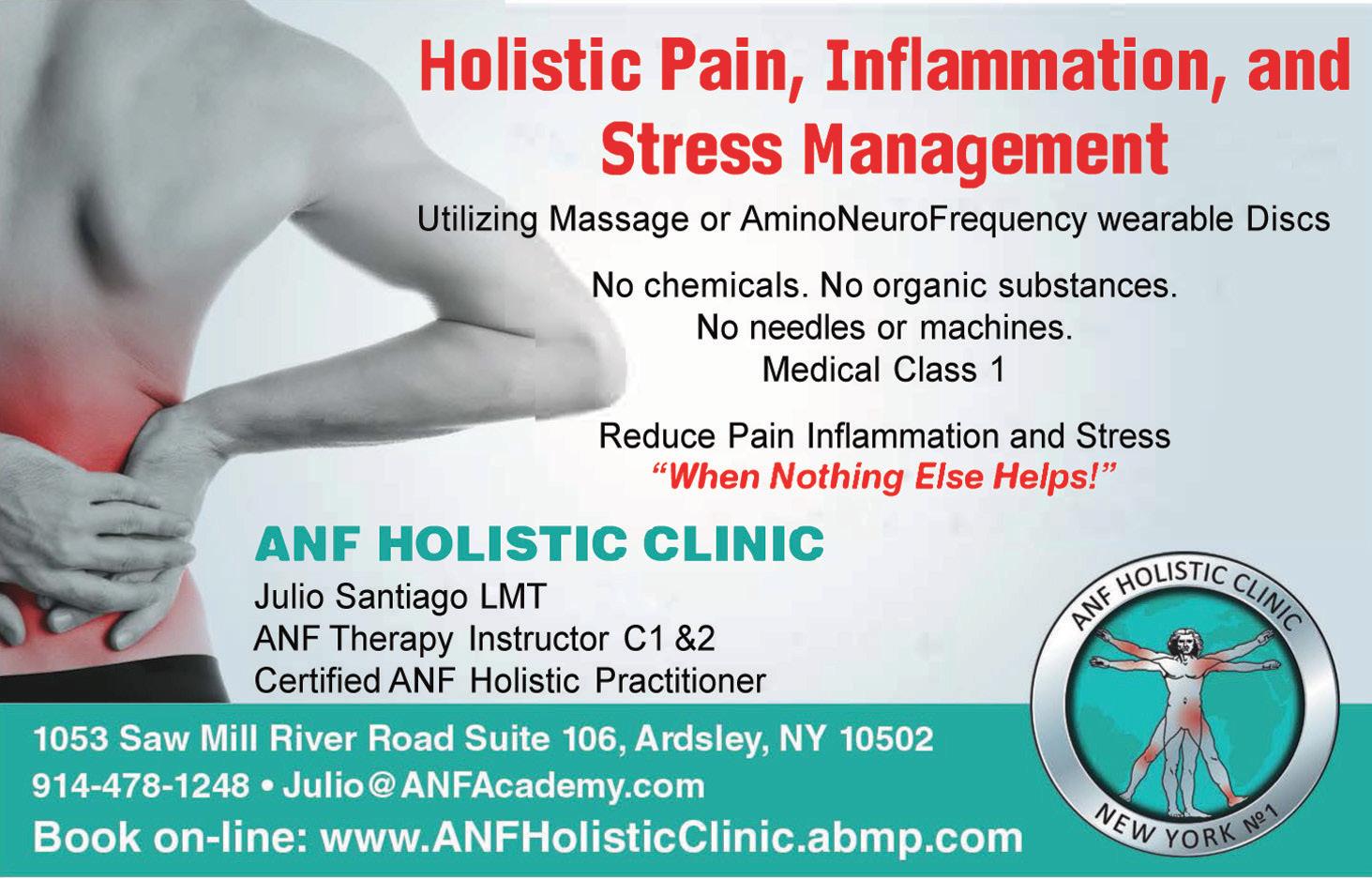
4 minute read
ON BALANCE
StepWISEnow class in Briarcliff Manor On Balance An Interview with Balance and Falls Expert Molly Roffman
by Connie Zuckerman
Advertisement
Molly Roffman—a tion, and A Matter of Balance: New York StateManaging Concerns about licensed physical Falls, with balance-fitness therapist specializing in fall classes such as Line Dance prevention and balance trainand Balance Basics, and ing—is founder and director of balance-component classes StepWISEnow Balance Fitness, such as Core Connect and in Briarcliff Manor. She was Seated Stretch & Strength, inspired to develop StepWIwhich focus primarily on SEnow by her experience rehabilitating patients who Molly Roffman strength and flexibility. sustained fractures and other fall-related Who is the ideal participant? injuries. Recently we sat down to discuss Anyone over the age of 55. There are often her work. Here are the highlights. subtle changes in our balance beginning in our mid-to-late 50s, and it’s vitally What is StepWISEnow? important to be proactive about balance StepWISEnow Balance Fitness is grounded fitness. The majority of our participants in the knowledge that falls are preventare women, so we’d like to encourage more able. As the New York State Department of men to take balance fitness seriously, since Health states, “Falls are not accidents! They they are more likely to die from a fall. Men are not random, uncontrollable acts of fate, need to understand their risk and take but occur in predictable patterns, with recpreventative action. We also provide a safe, ognizable risk factors and among identifiinclusive, welcoming place for people with able populations.” StepWISEnow combines movement challenges, such as Parkinson’s evidence-based fall-prevention programs disease, to participate with confidence and such as Tai Chi for Arthritis & Fall Prevensecurity.
Do you offer online classes?
In response to Covid-19, we have moved all our classes online. I can’t wait to reopen the studio when the time comes—it provides a great sense of community to our members—but we’ll definitely be keeping our online programs going forward.
What should older adults know about falls?
That most of them are preventable—they are not a natural consequence of aging. It’s also important not to minimize the warning signs of a trip or loss of balance and discount it as unlikely to happen again. The first fall is the greatest predictor that another fall is likely.
A fall is usually the result of multiple risk factors coming together. Risk factors can be divided into three broad categories: behavioral (rushing); environmental (slippery surfaces); and physiological (leg weakness). Fall prevention involves some elements of detective work. We must go back to the “scene of the crime” to identify all the circumstances that contributed to the fall so we know how to prepare and what to do differently moving forward.
What are the typical causes of balance problems in older adults?
A common cause is inactivity, which leads to weakness, stiffness, poor posture and loss of energy. Time spent watching screens—TVs, computers or cell phones— adds up. Adopting the 4 Cs can help: commitment to yourself to act, consistency of practice, challenging yourself each day, and confidence that you can improve and succeed. Being proactive is the key to fall prevention, and adopting the 4 Cs will help make a daily balance practice part of your lifestyle and routine.
A second, less well-recognized cause of falls is multiple medications. According to the CDC, simply being on four or more medications puts one at increased risk for a fall. It’s important that older adults have regular medication reviews with their primary physician to determine if they are on the right medications at the right dosages.
How can you work on balance at home?
There are many simple balance exercises you can do at the kitchen counter. These can be a combination of strengthening and stretching along with standing and dynamic balance activities. There are also strengthening, stretching and postural exercises you can do while seated until you’re ready to progress to standing. It’s important to begin a balance practice that is well within your comfort zone before beginning to gradually progress. We offer a variety of online classes at beginner and intermediate levels and seated and stand- ing levels as well.
How can you recover from a serious fall?
A fall can be a traumatic experience and be accompanied by the fear of falling again. Our eight-session, evidence-based program, A Matter of Balance: Managing Concern about Falls, combines problem solving, strategy building and exercise to help participants set realistic goals for increasing activity, create a personalized fall-prevention strategy, and learn simple exercises to increase strength and balance. We’re hoping to develop an online version of the program soon.
Any final words of wisdom?
The good news is that we can get stron- ger and improve our balance at any age. Willingness to identify our risk factors, to commit to a daily balance practice, and to modify our lifestyle if needed are elements of success. It may feel like a tall order, but it’s the key to maintaining our indepen- dence. We’re more powerful than we know, and we can use this power to take control of how we age.
Location: StepWISEnow, 325 S. Highland Ave., Ste. 109, Briarcliff Manor, NY. For more info, call 914.292.0602 or visit StepWISEnow.com. See ad, page 35.
Connie Zuckerman is co-founder of the website agebuzz, where she published the original interview from which this article was excerpted. Visit agebuzz.com to sign up for its free weekly newsletter on all aspects of aging.










